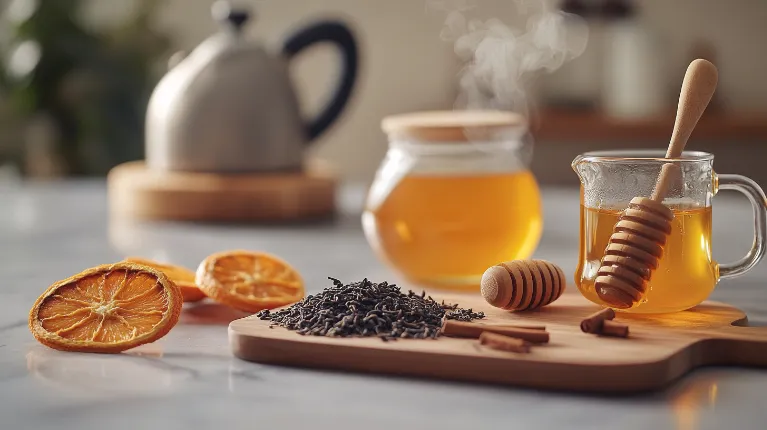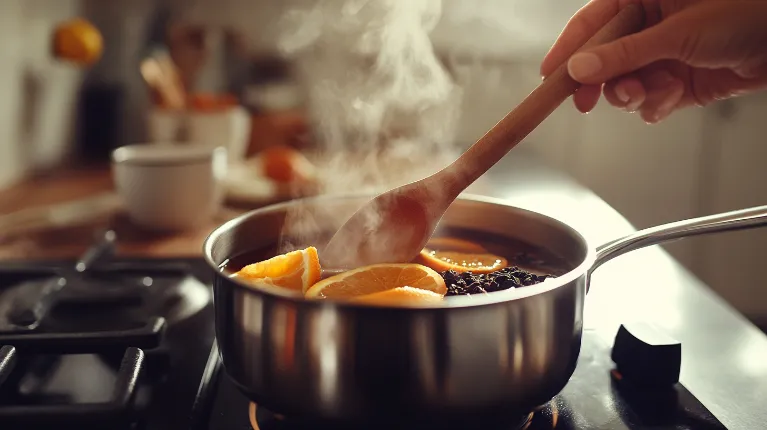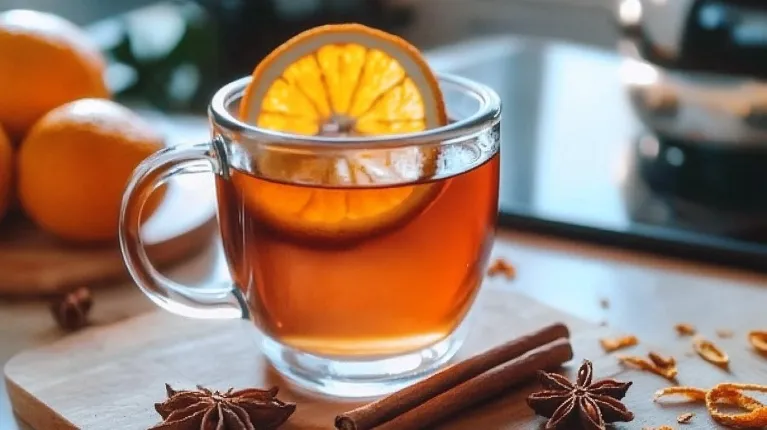Who doesn’t love the idea of sipping on a warm cup of tea with a citrusy twist? Orange tea is exactly that—a delightful blend of the classic tea experience with the invigorating zest of oranges. Whether you’re a seasoned tea lover or someone exploring new flavors, this brew is bound to tickle your taste buds.
Moreover, it’s not just about the taste. Orange tea comes packed with health benefits, from immune support to aiding digestion. Oh, and did I mention it’s super easy to make at home? You’ll see! Let’s dive in and explore everything from its origins to how you can whip up your own cup.
Check out this guide to tea blends to discover more creative combinations for your tea adventures!
History and Origin of Orange Tea
The Birth of a Citrusy Delight
The origins of orange tea trace back to the vibrant tea culture of China and Southeast Asia. Traditional Chinese medicine often incorporated dried orange peels into herbal teas for their aromatic and medicinal properties. Over time, the practice spread, blending seamlessly with various tea traditions worldwide.
A Cultural Infusion
Did you know that the British often paired their black tea with orange zest during colonial times? It wasn’t just about the flavor—it added a touch of sophistication. Meanwhile, in the Middle East, dried orange peels are still a popular addition to spice-infused teas, reflecting their love for bold, zesty beverages.
A Modern Twist
Today, orange tea isn’t confined to any one culture. From orange spice black tea in the U.S. to herbal citrus blends in Europe, this versatile brew has become a global favorite. It’s fascinating how something as simple as a fruit peel can turn into a worldwide sensation.
Ingredients and Equipment
Ingredients (with Substitutions)
| Ingredient | Quantity | Substitution |
|---|---|---|
| Black tea leaves (or bags) | 1 tsp or 1 bag | Green tea or rooibos for variation |
| Dried orange peel | 2 tsp | Fresh orange zest (use sparingly) |
| Cinnamon stick | 1 piece | Ground cinnamon, a pinch |
| Honey (optional) | 1 tsp | Maple syrup or agave nectar |
| Water | 2 cups | No substitute here, it’s water! |
Equipment
- Medium saucepan or kettle
- Tea infuser or strainer
- Mug (preferably your favorite one—because it matters!)
- Stirring spoon
Pro tip: Don’t have dried orange peels? Make your own by slicing orange rinds thinly and drying them in the oven at 200°F for about an hour.

Step-by-Step Guide: Brewing the Perfect Cup of Orange Tea
Step 1: Prepare Your Ingredients
First, gather all your ingredients and equipment. If you’re using fresh orange zest instead of dried peels, use a fine grater to zest an orange. Make sure to avoid the white pith—it can taste bitter. If you don’t have a cinnamon stick, a small pinch of ground cinnamon will work.
Step 2: Boil the Water
Next, bring 2 cups of water to a boil in a medium saucepan or kettle. For the best flavor, use filtered water, as it keeps the tea’s taste clean and crisp.
Step 3: Combine Ingredients
Once the water is boiling, reduce the heat to a simmer. Add your black tea (loose leaves or bag), dried orange peel, and the cinnamon stick. Stir gently to mix the ingredients, allowing the flavors to infuse.
Helpful Tip: If you’re preparing a caffeine-free version, swap the black tea with herbal alternatives like rooibos or chamomile. The orange peel pairs wonderfully with these!

Step 4: Steep and Simmer
Let the mixture steep on low heat for about 5 minutes. During this time, the aroma of the orange peel and cinnamon will begin to fill your kitchen. Honestly, this is one of my favorite parts of making orange tea—the smell is heavenly!
Step 5: Strain and Sweeten
Then, remove the saucepan from the heat. Using a tea strainer, carefully strain the tea into your favorite mug. If you like your tea sweet, stir in a teaspoon of honey or maple syrup while it’s still warm.
Optional Tip: For a refreshing iced version, let the tea cool to room temperature, then pour it over ice. Garnish with a slice of fresh orange for a fancy touch!
Variations to Try
Orange Spice Tea
For a spiced version, add a few cloves and a small piece of star anise during the simmering step. This variation is perfect for winter evenings when you want a cozy drink.
Iced Orange Herbal Tea
If you’re in the mood for something cool and refreshing, follow the basic recipe but skip the black tea. Use hibiscus flowers or peppermint leaves instead. Once brewed, chill the tea and serve with mint leaves and orange slices.
Orange Ginger Tea
Looking for a zesty kick? Add a teaspoon of freshly grated ginger to the boiling water along with the orange peel. Ginger not only enhances the flavor but also boosts the tea’s health benefits.
Tips for the Perfect Brew
- Always use fresh ingredients for the best flavor. Stale tea leaves or old orange peels can dull the taste.
- If you prefer a stronger orange flavor, add an extra teaspoon of dried peel or a few drops of orange extract.
- Don’t steep the tea for too long, as it can turn bitter. Five to seven minutes is the sweet spot.
Related Recipe
If you enjoy this orange tea, you’ll love trying out this Cream Cheese Banana Bread with Cinnamon Topping Recipe for a perfect tea-time pairing. It’s a match made in heaven!
Closing Thoughts
And there you have it! A simple yet flavorful way to enjoy orange tea right at home. Whether you prefer it warm and spiced or cool and refreshing, there’s a version for every mood and season. So, why not give it a go? Brew a cup today, and let the bright, zesty flavors brighten your day.
Tips for Perfecting Your Orange Tea
Common Challenges and How to Overcome Them
Brewing the perfect orange tea might seem easy, but there are a few pitfalls to watch out for. Don’t worry; with these tips, you’ll nail it every time.
Bitter Taste? Here’s What to Do
If your tea tastes bitter, it’s likely been steeped too long or at too high a temperature. To fix this:
- Solution: Reduce the steeping time to 3–5 minutes. For green tea-based versions, lower the water temperature slightly to avoid over-extraction.
- Pro Tip: Use a timer! It’s an easy way to keep things under control.
Weak Flavor? Try This
A bland cup of orange tea can leave you unimpressed. However, you can enhance the flavor without overloading on ingredients.
- Solution: Add an extra teaspoon of dried orange peel or a small drop of orange extract.
- Pro Tip: For a stronger brew, use loose-leaf tea instead of tea bags—they pack more punch.
Cloudy Tea? Don’t Panic
Cloudiness might occur when your tea cools, especially with herbal or iced versions. On the other hand, it doesn’t affect taste.
- Solution: Strain the tea through a fine mesh before cooling. If serving iced, add a splash of lemon juice for a clear, vibrant look.
Helpful Tips for Consistency
- Always measure ingredients to maintain a consistent flavor profile.
- Use fresh, high-quality tea leaves and orange peel for the best results.
- Experiment with spices like cardamom or nutmeg for a unique twist.
With these tips, your orange tea will be consistently flavorful, whether you’re sipping it on a lazy afternoon or serving it to guests.
Serving and Garnishing Ideas
Creative Serving Suggestions
A well-presented cup of orange tea elevates the experience (oops—almost used the wrong word there!). Here are some creative ways to serve your tea:
Warm Tea for Cozy Evenings
Serve your tea in a clear glass mug to showcase its vibrant orange hue. Add a cinnamon stick as a stirrer for an aromatic touch.
Iced Tea for Summer Days
Pour your chilled orange tea into a tall glass filled with ice cubes. Garnish with a sprig of mint and a slice of fresh orange for a tropical vibe.
Pairing and Side Dishes
Pairing orange tea with complementary treats takes it to another level:
- Sweet Pairings: Enjoy your tea with a light citrus cake or a scone. For a perfect match, check out our Cream Cheese Banana Bread with Cinnamon Topping Recipe.
- Savory Pairings: Serve alongside finger sandwiches or a fresh salad with a citrus vinaigrette
A Little Extra Touch
For a festive presentation, rim the glass or mug with sugar mixed with a hint of orange zest. This simple trick not only looks elegant but adds a subtle burst of citrus flavor with every sip.
For more tea-time inspiration, feel free to explore our collection of recipes. There’s always something delightful waiting to complement your cup of tea.
Healthier Alternatives and Dietary Considerations
Health-Friendly Ingredient Swaps
If you’re looking to make your orange tea healthier or adapt it to specific dietary needs, don’t worry—it’s incredibly flexible! Here are some easy swaps and tips to suit various preferences:
Low-Calorie Alternatives
- Sweeteners: Instead of honey, you can use stevia or monk fruit sweetener. They’re zero-calorie options that don’t compromise on flavor.
- Base Tea: For a lighter brew, use white tea instead of black tea. It’s milder in taste and has fewer tannins.
Caffeine-Free Variations
If caffeine isn’t your thing, you can make a delightful herbal orange tea:
- Swap out black tea with rooibos, chamomile, or peppermint. These teas blend beautifully with the citrusy notes of orange peel.
- Add a pinch of turmeric for an earthy twist that’s also anti-inflammatory.
Sugar-Free Options
Want to skip sweeteners altogether? The natural sweetness of dried orange peel is often enough. For a richer flavor, add a drop of vanilla extract or a few crushed berries.
Pairing Beverages with Orange Tea
If you’re serving orange tea as part of a meal or tea party, consider pairing it with complementary drinks:
- Morning Pairing: Serve alongside a fresh orange smoothie for a double dose of citrus.
- Evening Pairing: Pair it with a warm, spiced cider for a cozy, comforting combo.
Storing and Reheating Orange Tea
Practical Storage Tips
Leftover orange tea? No problem! Here’s how to store it properly so it stays fresh:
- Refrigeration: Pour leftover tea into a glass container with a tight lid. Refrigerate for up to 3 days.
- Freeze for Later: Want to save it longer? Pour the tea into ice cube trays and freeze. These cubes make great iced tea bases.
Reheating Like a Pro
Reheating tea can be tricky, but these tips ensure it tastes just as good the second time:
- Use low heat on the stove to warm the tea gently without overcooking the flavors.
- Avoid microwaving if possible—it can alter the tea’s delicate taste.
- For iced versions, skip reheating entirely and enjoy it chilled straight from the fridge.
Frequently Asked Questions About Orange Tea
What is Orange Tea Good For?
Orange tea is not just a flavorful beverage; it’s packed with health benefits too. For example, it’s rich in antioxidants like vitamin C and flavonoids, which help support your immune system and combat free radicals. Additionally, the citrusy notes of orange peel can soothe digestion and promote metabolism, making it a great after-meal drink. If you’re feeling under the weather, the warm citrus aroma can also provide a comforting boost.
What is Orange Tea Called?
Orange tea might have a simple name, but it refers to various types of tea infused with orange peel, zest, or essence. For instance, in some regions, it’s called orange spice tea when blended with warming spices like cinnamon and clove. Meanwhile, herbal blends without caffeine are often just labeled as orange herbal tea. Regardless of the name, its vibrant flavor always stands out.
Can You Put Oranges in Hot Water?
Absolutely! You can add fresh orange slices or zest to hot water for a light, citrus-infused tea. However, for a more robust flavor, dried orange peel works best as it intensifies the tea’s aroma. Consequently, if you don’t have dried peel on hand, fresh zest is a quick and easy alternative. Just be careful to avoid the bitter white pith when zesting.
Do Orange and Tea Go Together?
Without a doubt, orange and tea are a match made in heaven. The bright, tangy notes of orange beautifully complement the earthy, bold flavor of black or green tea. For example, adding cinnamon or ginger to the mix elevates the pairing further, creating a well-rounded, flavorful experience. Whether you prefer it warm or iced, orange tea offers a perfect balance of sweetness and zest.
Conclusion and Final Thoughts
Wrapping It All Together
So, there you have it—everything you need to know about orange tea. From its rich history to easy, customizable recipes, this delightful beverage has something for everyone. Whether you’re brewing a warm cup to cozy up with or experimenting with iced versions for summer, orange tea is versatile and satisfying.
For example, if you’re new to citrusy teas, start with a simple recipe and adjust it to your taste. Remember, the joy of tea-making is in the journey—experimenting with ingredients, sipping, and savoring every moment.
So, now that you’ve mastered the art of brewing orange tea, why not explore some creative side dishes to serve with it? A fresh and delicious option is our Easy Caesar Pasta Salad Recipe: A Delicious Twist on a Classic Favorite. Together, they create a perfect balance of zest and freshness for any occasion.
Try It Yourself!
Why not give orange tea a try today? We’d love to hear how it turns out for you. Share your feedback, tips, or even your own twists on the recipe.
Final Encouragement
Life’s too short for boring drinks. So, grab your favorite mug, some fresh oranges, and get steeping. After all, a simple cup of orange tea might just become your new favorite ritual. Cheers to good health and great flavors!




